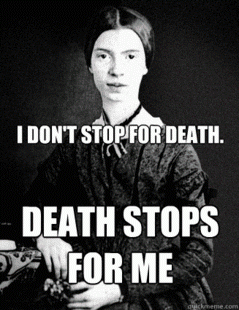Who says us white leftists have no feeling for High Art? Hundreds of thousands of capitalist imperialist museum-going, opera-loving, overly literate fuck-faces, that’s who.
To smash this top-down bourgeois conspiracy, I am taking a couple of months off from writing this column to start a highly classy — yet class-conscious — literary journal, to be edited by yo mismo. As an editor, I can finally provide the sensitive artistic blowback needed to Fight the Power!
Yes, editing is how I will change the System from within. Like if I want to call those dudes painted on the ceiling of the Sistine Chapel racist patriarchal dickwads, I can — cause I’m an editor! Best of all, I can get privileged, bourgie writers to “submit” their work, then inform them in a cool, professional manner that they suck.
Already, I am getting a lot of thrillingly inadequate “submissions.” For example, somebody just mailed in a few weird poems by some small-town wannabe aesthete named Emily Dickinson. Here is some primo editing I did to make her work worthy of the Revolution:
Because I could not stop for Death,
He kindly stopped for me;
The carriage held but just ourselves
And immortality.
Unclear, comrade. Are you not feeling well? You’re not dead, are you? If you are not dead, why couldn’t you “stop for death”? If you are dead, how could you be writing this poem? To avoid confusing and/or upsetting the People, I would suggest a more cause/effect-oriented rhyme scheme at the outset. E.g., this might work: “As an activist, I can’t stop for Death / Because my busy schedule fighting for social justice leaves me out of breath.”
“But just ourselves” verges on the non-grammatical and is not very succinct, either, when you come to think of it, which will be often, I hope, given the fact that we are all deeply concerned about today’s global situation involving crises such as police violence, endless war, and climate change, and we do not have time to read things that just go on and on and on and on, for heavens sake, if you take my meaning, which I hope you do and if you don’t you should think about why not, it is imperative.
“The carriage held ONLY ourselves / and Immortality,” is more economical, word-wise. Actually, “Immortality,” especially when capitalized, seems like a word some white, ruling-class yuppies would use to celebrate gentrifying another neighborhood. Perhaps you could work in some grassroots, “People’s” imagery here. Replace “Immortality” with “LbertEE” or “Quilting BEE.”
 |
It’s a nice touch to make “Death” a male, and shows that you are a caring feminist. But do you really think that Death is “kind”? Or do you mean your statement ironically? If so, please rethink how your societal privilege to be ironic could offend a lot of people who are too oppressed to read this in the first place.
Does Death come “kindly” for the thousands of impoverished, globally displaced multicultural laborers who fall prey to the machinations of an overweening U.S. imperialist patriarchy? Are these people invited into “carriages” when they die? I think not. Why don’t you tell their story? “The carriage held only ourselves and thousands of impoverished, globally displaced multicultural laborers / All having a quilting bee” is probably closer to what you mean.
On to your next poem:
After great pain, a formal feeling comes —
The Nerves sit ceremonious, like Tombs —
OK, let me stop you here. Once again, I am forced to blame you for my not being able to understand something. Furthermore, it is not clear from your word choice that you have really suffered.
I can’t tell you how many people have known greater pain than you have, toots. Try throwing away your class privilege and listening to the stories of others, less fortunate than yourself. For instance: Me.
I, myself, have known great pain. Once, my corporate, dress-for-success woman boss slammed my hand in the door of her temp agency office. She was in the middle of firing me for using her Xerox machine to run off a few thousand save-the-earth flyers. So even though she said it was an “accident,” I didn’t believe her.
From that, I learned that after great pain, a throbbing feeling comes. Actually, “throbbing” would be a good adjective to replace “formal,” as it denotes a certain salt-of-the-earth, workers’ sensibility missing here. But we digress. . .
The soul selects her own society
Then shuts the door;
On her divine majority
Obtrude no more.
This is NOT a sentence. Are you even trying? Granted, agoraphobia may be a psychological problem, but do you really want to depict self-indulgent characters who can afford to stay inside all day and not go to work? Also, “divine majority” sounds like you are some Tea Party presidential candidate. Finally, avoid offending your readers by using big words like “Obtrude” that they have to waste valuable time looking up. Big words also wreak havoc with your spellchecker, or however that is spelled.
I regret that my schedule allows me only enough time to read the first stanzas of your poems. But if these are any indication, you really need to buckle down and get proactive before they can meet our editorial needs. To prime your literary pump, you you might try studying some of the amazingly popular — yet deep — poems now posted on Instagram and Tumblr. And don’t forget to thank the masses for once again showing us the way!
Good luck, comrade! And remember: If you’re ever stumped for a topic, just write about what you know.
Susie Day is a writer. Her book Snidelines: Talking Trash to Power is available from Abdingdon Square Publishing: <www.abingdonsquarepublishing.com/snidelines.htm>.
